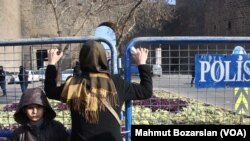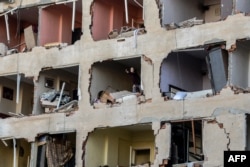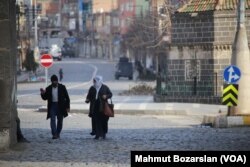The Britain-based human right's group Amnesty International published a report Tuesday demanding Turkish authorities respect the right of return of up to half a million people displaced by fighting between the Turkish state's war against the Kurdish rebel group, the PKK.
The Amnesty report, titled "Displaced and Dispossessed," focused on Diyarbakir, the main city of Turkey's predominantly Kurdish southeast. It highlighted the Sur district, devastated by months of fighting between the PKK and Turkish security forces.
"People were forced from their houses with very little notice. Many of them are now living in poor conditions," said Andrew Gardner, the report's author and Turkey researcher for Amnesty International. "Their children haven't been able to access education in certain circumstances. But most importantly for them, they are very concerned regarding their ability to return back to their communities, back to neighborhoods, back to their homes."
The report claims 24,000 people in Sur were forced from their homes, and 2,000 properties have been demolished during and after the fighting. Amnesty claims that under international law, Ankara is obliged to allow people to return home. Ankara insists that right of return will be respected.
"Our duty is to fix the infrastructure and give it back to the people here," stated Bilal Ozkan, the state-appointed mayor of Sur, in an interview in October. Ozkan replaced the democratically elected mayor who was removed from office after being accused of supporting terrorism.
"The owner of Diyarbakir is its inhabitants. The owner of Sur are its inhabitants. There is definitely no plan for pushing our citizens further away," Ozkan added.
Government’s vow in question
The Amnesty report said that more than 60 percent of the Sur district had been expropriated by the state under emergency legislation. The report claims many areas in Sur remain under curfew and are off limit to residents, even though the fighting has ended.
Amnesty's Gardner said there is little evidence that the government is prepared to honor its commitments.
"It was remarkable that none of the families we spoke to had been provided with any sort of information by the authorities as to what compensation they would receive for their houses,” he said. “Frankly, it is looking less likely that families would be able to access their right to return."
The Amnesty report highlighted the historical significance of Sur, a UNESCO world heritage site. It described the unique nature with its tight-knit community that helped to sustain families, most of whom were poor with large families.
A significant proportion of those families are experiencing the loss of their homes for a second time.
"Many of the people who I spoke to who are most determined to go back to Sur," Gardner said, "are people who've been displaced previously from their villages in southeast of Turkey, as part of the state's anti-terrorism operations against the PKK during the 1980s and ‘90s."
NGO closures, winter add to struggle
Amnesty did acknowledge that some state assistance has been provided for rented accommodation or hotels for the displaced families. But no support has been given to the many who've lost their jobs. The plight of thousands has been compounded by the closure under state of emergency rule of many non-governmental organizations assisting displaced people.
"Their situation has been clearly made much worse by these NGO's closures," Gardner said. "Now the state has confiscated the property, food and money that was to be given to displaced people and poor people in Diyarbakir."
With the region now in the grip of winter, concern is growing for the plight of the people.
"It's a real question mark,” Gardner said. “What is going to happen to these people who are living in extreme poverty relying on delivery of food to just to get by? There're some 32,000 people relying on this support in Diyarbakir alone. These people are struggling to survive in difficult conditions, obviously now in very harsh winter conditions."
Heavy snow and freezing conditions have already hit much of the Kurdish region.
The Amnesty report claims many towns and cities in the region have shared Sur's fate, with up to half a million people displaced by the fighting all sharing an uncertain future — not knowing if their homes are intact, or if they will ever be allowed to return.







